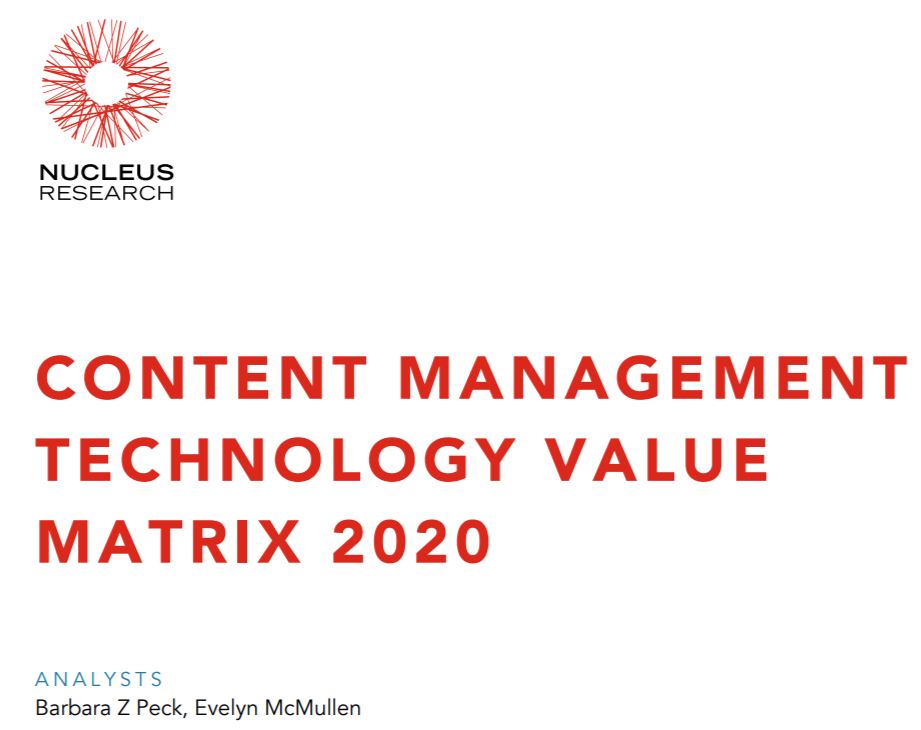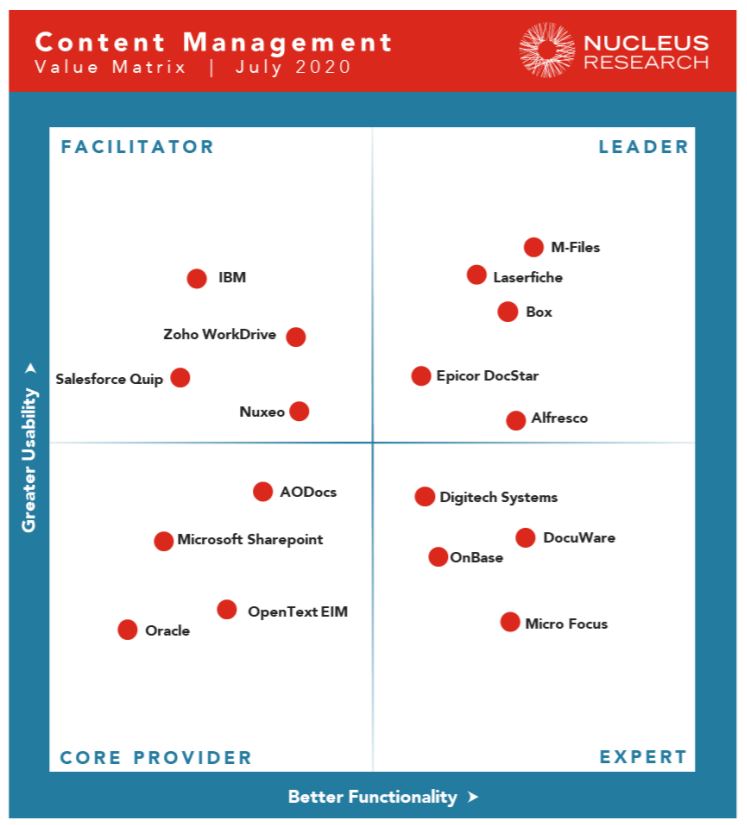NUCLEUS Content Management Technology Value Matrix 2020
21. Juli 2020 12:54 Uhr | Dr. Ulrich Kampffmeyer | Permalink

Im Juli 2020 hat das Marktforschungsinstitut NUCLEUS RESEARCH seine Content Management Technology Matrix Studie für 2020 veröffentlicht (kostenfreier Download nach Registrierung z.B. bei M-Files https://bit.ly/32Dek9w) . Dieses Mal sind 17 Anbieter bewertet worden. Zu “klassischen” Anbietern sind einige neue hinzugekommen. Und es hat eine Reihe von Verschiebungen gegeben.
Zunächst fällt auf, dass NUCLEUS nicht mehr von ECM Enterprise Content Management spricht. In der ECM-Technology-Value-Matrix 2019 (damals bereits unter CM & Collaboration) waren im Prinzip die gleichen Anbieter dabei (einige fehlen aber jetzt in der neuen Content Management Value Matrix). Auch NUCLEUS bewegt sich mit seiner Einordnung in Richtung Content Services, weg von ECM.
Bei den Anbietern handelt es sich vorrangig um Unternehmen, die im US-Markt und auch international tätig sind. NUCLEUS bewertete die technischen Eigenschaften der Produkte und teilte diese in Leader, Experten, Facilitators und Core Provider ein. Die Bewertungsachsen sind Better Functionality und Greater Usability.
Im LEADER-Quadranten finden sich M-Files, Laserfiche, Box, Epicur DocStar und Alfresco. Am meisten hat M-Files aufgeholt.
Im FACILITATOR-Quadrant, mit weniger Funktionalität aber ähnlicher Usability, finden sich IBM, Zoho Workdrive, neu Salesforce Quip und Nuxeo.
Bei den EXPERTs sind Digitech Systems, Docuware, Hyland Onbase und Micro Focus zu finden. Also auch Anbieter, die in der ECM Values Matrix sich früher im LEADERs befanden.
Als CORE PROVIDER gelten AODocs, Microsoft mit Sharepoint, OpenText mit EIM und Oracle. Auch Microsoft und OpenText wurden früher als leistungsstärker eingeordnet.
Die Detailbewertungen und Einordnungsargumente für die einzelnen Produkte können in der Studie nachgeschlagen werden.

Aus der Studie die Zusammenfassungen:
<Zitat> “THE BOTTOM LINE
The Covid-19 pandemic has forced the acceleration of content management improvements, including functionality and ease of use, making it more essential and valuable than ever.
Remote workers require access to data, with security and risk management assurance, and a collaboration tool that is a ‘single source of truth’ for all information across an organization.
Last year’s Value Matrix user feedback led with AI and ML automation, integration, capture, and collaboration. This year, users reported similar priorities but with a greater focus on straightforward integrations with core business applications and scalability as value drivers.
MARKET OVERVIEW
The shift to remote work has strained the limits of traditional, monolithic Content Management (CM) solutions, forcing companies to focus on defining a strategy to deal with the growth of volume in content, data, and document needs, rather than traditional document storage. Content management is one of the oldest and most mature technologies in the software market but is needed to modernize its offerings in response to the ‘new normal’. Innovative vendors will continue to devise solutions that redefine the way CM technology will maximize efficiency, productivity, and direct value to the users.
When looking for a CM solution, either as a replacement for a legacy platform or a new investment, users reported that they are investing in consulting services to not only define the company’s needs, but also assist with deployments and ensure that the buyer is prepared for future needs. Some clients Nucleus interviewed also stated that any solution under consideration must have a well-designed user experience (UX), a minimal ‘learning
curve’ to be fully operational, and must include low-or no-code integrations with existing core business applications. Robotic process automation (RPA) to handle high-volume, repeatable tasks that previously required humans to perform is also reported as critical by reducing manual tasks to increase productivity and add value. Users reported that their selection of a CM vendor is now based on the following:
▪ Content integration into core business processes
▪ Comprehensive security and records management
▪ Flexible and hybrid deployments
▪ Automated taxonomy.
Not long ago, remote work was considered inefficient and costly since remote workers could not be directly managed as well as in-house staff. That paradigm is no longer valid – as stated in the previous Value Matrix, output and accuracy are more accurate and compelling measurements of value delivered by a software solution.
Nucleus believes that major changes to CM delivery are coming in the near future and predicts that single-purpose vendors and those without the ability to integrate with existing business software, will be either acquired by full suite companies or cease to exist. Some best-of-breed CM providers may continue to serve small and midsized businesses (SMBs) or a specific niche but cannot compete with vendors that offer a full range of options to meet all of an organization’s needs. In other words, standalone CM platforms will begin to disappear. Look for increased mergers and acquisitions over the next 18 months.</Zitat>
